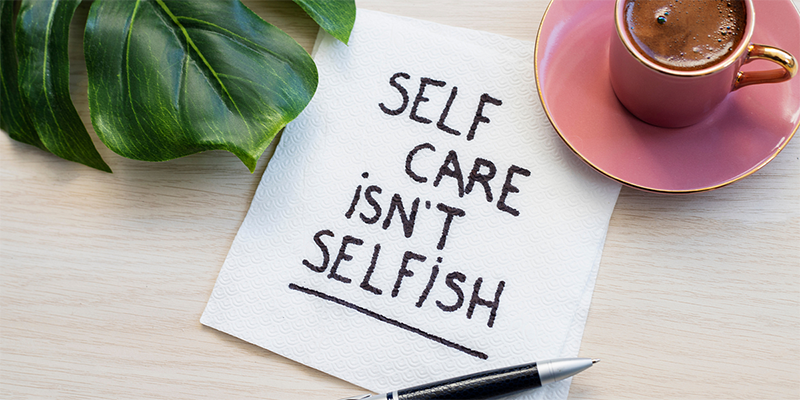How To Nurture Yourself: A Comprehensive Guide To Self-Care
This guide will help you understand why nurturing yourself is essential and how you can make it a part of your life.
It's easy to neglect your well-being in the rush of daily life.
Balancing work, family, or personal challenges and prioritizing yourself may be selfish or impossible. But forgetting self-care is a big mistake because self-care nurtures your mind, body, and spirit and helps you thrive.
This guide will help you understand why nurturing yourself is essential and how to make it a part of your life.
Why You Must Nurture Yourself
Social media will make you believe that self-nurturing is all about pampering yourself. But the truth is that it is an acknowledgement of your well-being. Let me tell you why nurturing yourself is so important:

I. Boosts Self-Worth: Take time for yourself to feel valued. This shifts your mindset from surviving to acknowledging your worth and investing in your happiness.
II. Reduces Stress: Long-term stress can affect physical and mental health. Self-nurturing can act as a buffer. Its potential has been documented to manage anxiety and promote a sense of calm.
III. Improves Resilience: Anything can happen at any time, and unexpected challenges can come your way. If you practice consistent self-care, you will be better equipped to manage moments without feeling overwhelmed or burnt out.
The Importance Of Self-Care
No. Self-care is not a trend. It's been around forever, and—it's essential for overall well-being. When you care for yourself, you start taking the first steps to prevent burnout. You also cultivate a more balanced, joyful life.
Want to know why self-care matters? Here’s the answer:
I. Promotes Emotional Health: Staying regular at self-nurturing practices helps take care of emotions effectively. Moments where you feel balanced make it easier to go through the ups and downs of life.
II. Enhances Physical Health: Physical activities such as exercise and quality sleep improve mood. They can also strengthen your body while reducing the risk of illness.
III. Supports Personal Growth: Self-care is a great way to learn new skills and reflect on goals. Use your self-care routine as an opportunity to explore personal interests. This growth will make your life more fulfilling.
Identifying Your Needs
The first step to nurturing yourself is understanding what you need. You need to dig deep to discover your long-term desires and not just implement some short-term fixes.
Here are questions that I recommend you ask yourself:
I. What makes me feel happy, at peace?
II. What do I need more: rest, fun, or connection?
III. What emotional voids am I trying to fill?
IV. What aspects of my life feel neglected?
How To Nurture Yourself: Practical Tips
1. Physical Self-Care
Taking care of your body lays the foundation for well-being. Here’s how to nurture your physical health:
a. Eat Nourishing Foods: Find recipes that use nutrients essential for your body. Eating well does not mean going on a strict diet. Instead, you need food that makes you feel good and fuels your body!
b. Stay Active: Think exercise is a chore? Think again. Start choosing activities you enjoy, like dancing, football, or yoga. The movement will ultimately support both your body and your mind.
c. Get Quality Sleep: As Bryan Johnson says, sleep impacts everything, from mood to memory. Try to get a consistent sleep schedule. This will involve having a screen-free hour before bed to ensure restorative sleep.
d. Get Outside: Studies have found that being in nature can lower cortisol levels. Greenery also reduces blood pressure and boosts happiness. Even a 15-minute walk in a park can refresh you.
2. Social Self-Care
The first warning sign of depression is social withdrawal. Social connections are vital for emotional health.
Here's how to nurture yourself socially:
a. Reconnect with Friends: Set a coffee date or call with a friend. Your aim should be to have meaningful conversations which uplift your mood and reinforce bonds.
b. Join a Community: You can join a book club, an exercise group, or a crafting circle. The point is to find a community that shares your interests. Connection with others is an excellent shield against loneliness.
c. Volunteer: Helping others makes humans happy. This is an undeniable fact. It benefits your community and gives you a sense of purpose and satisfaction.
3. Mental And Emotional Self-Care
Nurturing your mind and emotions can foster inner peace and growth. Here are some practices:
a. Practice Gratitude Journaling: Take a few minutes daily to write down what you are grateful for. This will shift your focus to the aspects of your life you love and start building a resilient mindset.

b. Learn Something New: Learning is a great way to ignite your curiosity and inspire a sense of achievement. You can do this by learning a new language, watching a podcast, enrolling for a course, and even learning a new workout routine.
c. Self-Compassionate Talk: Replace negative self-talk with positive affirmations. If you start telling yourself positive affirmations in the morning and before sleeping, your life will change completely.
d. Set Boundaries: Learning to say "no" is an underrated skill. It is essential for protecting your time and energy. Take this crucial skill for mental well-being seriously.
Addressing Deeper Needs
Sometimes, self-care goes beyond surface-level activities. It’s about addressing core emotional needs:
a. Inner Child Work: Honor those aspects of you that needed to be celebrated or listened to before. Speak kindly to yourself and meet needs that have not been met before.
b. Self-Forgiveness: Let go of guilt over things you did wrong. I am not the worst version of myself, and I must remember that. I am allowed to expand and evolve. Adopting this mindset will relieve the pressure weighing you down from progressing to your full potential.
c. Authenticity: Live according to your principles. If you need autonomy regarding life decisions, then be you. Do things that uphold your values and create a life in alignment with those values.
Making Self-Care a Habit
Self-nurturing is a lifestyle. Here's how to make it a consistent practice:
a. Schedule It: Block off time on your calendar for self-care like work or other weekly appointments. Make it a sacred part of your week.
b. Start Small: Start with something easy, like walking in the park once a week or meditating for 5 minutes each day.
c. Reflect and Adjust: Every few weeks, assess whether your self-care practices work. Modify them appropriately according to your present needs.
Challenges to Self-Care and How to Overcome Them
Self-guilt is common when people start taking time for themselves. Acknowledge these feelings, but do what you want to do anyway. A little self-care will be good for you and everyone around you.
Sometimes, life is hectic, and sometimes, we can only manage self-care, which takes 10 minutes, but every 10-minute pocket counts. Take those short breaks and do something nice for yourself—stretch, breathe, listen to a favourite song.
Everyone needs more motivation from time to time. Whenever negative emotions crop up, force yourself to remember why you are doing what you are doing. Revisit your goals and visualize the rewards of taking care of yourself.
Quick Self-Care Ideas
1. 10-Minute Activities:
a. Enjoy a cup of tea mindfully.
b. Jot down three things you are thankful for.
d. Do some stretching or a short exercise
2. 30-Minute Activities:
a. Call a friend or loved one.
b. Revisit a chapter of one of your favourite books.
c. Take a walk and enjoy the view
3. One-Hour Activities:
a. Attend a class or workshop.
b. Consider soaking in a warm bath while listening to soothing sounds.
c. Cook a nourishing meal.
Embrace Your Power
Taking time for self-care is NOT a luxury. It is simply realizing that you can give yourself everything you need. Ease into it, listen to yourself, and grant yourself some breaks. Caring for yourself prepares your foundation for a healthier, more balanced, and more fulfilling life.